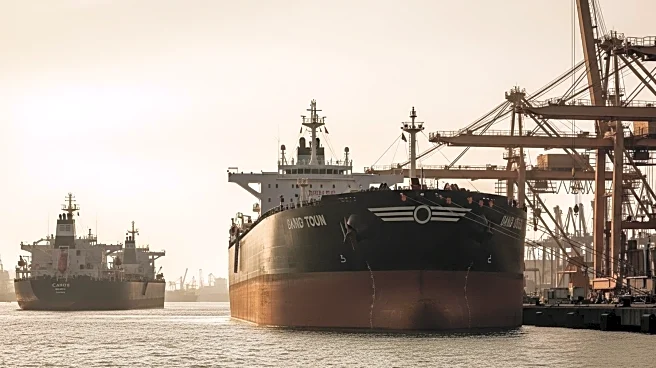What is the story about?
What's Happening?
Terminal operators at Huangdao Port in Shandong province, China, are set to enforce new measures banning shadow fleet vessels starting November 1. This decision targets ships using fake IMO numbers and those older than 31 years, which are often involved in transporting oil under Western sanctions. The move follows the U.S. designation of an oil terminal in nearby Dongjiakou port as receiving Iranian oil carried by sanctioned vessels. The new rules are seen as a precautionary step driven by environmental concerns and increasing U.S. sanctions pressure, although the latter is not explicitly mentioned in the notice. The measures include banning vessels with invalid or expired certificates and those with a history of pollution or accidents in the past three years. A scoring system will rate vessels' risk levels, with older ships receiving lower scores, and those rated below 55 will be barred from anchoring.
Why It's Important?
The ban on shadow fleet vessels at Huangdao Port reflects China's response to international pressure regarding oil transportation under sanctions. As the largest entry point for Iranian oil, the port's new measures could impact global oil trade dynamics, particularly for countries relying on Iranian oil. The scoring system and risk-rating rules aim to enhance environmental safety and compliance with international standards, potentially influencing other ports to adopt similar measures. This development may affect traders and shipping companies involved in transporting sanctioned oil, as they may need to seek alternative routes or comply with stricter regulations.
What's Next?
The implementation of these measures may prompt reactions from major stakeholders, including oil traders, shipping companies, and international regulatory bodies. Companies involved in the shadow fleet may need to adjust their operations to comply with the new rules or face restrictions. Additionally, the move could lead to increased scrutiny and pressure on other ports handling sanctioned oil, potentially resulting in broader regulatory changes in the industry. Observers will be watching for any diplomatic responses from countries affected by these sanctions, particularly Iran and the United States.
Beyond the Headlines
The ban on shadow fleet vessels highlights the ongoing tension between China and Western countries over sanctions and oil trade. It underscores the complex interplay between environmental concerns and geopolitical pressures in global trade. The decision may also influence China's future energy policies and its approach to international sanctions, as it balances economic interests with diplomatic relations. The long-term impact could include shifts in global oil supply chains and increased emphasis on compliance with international maritime regulations.















